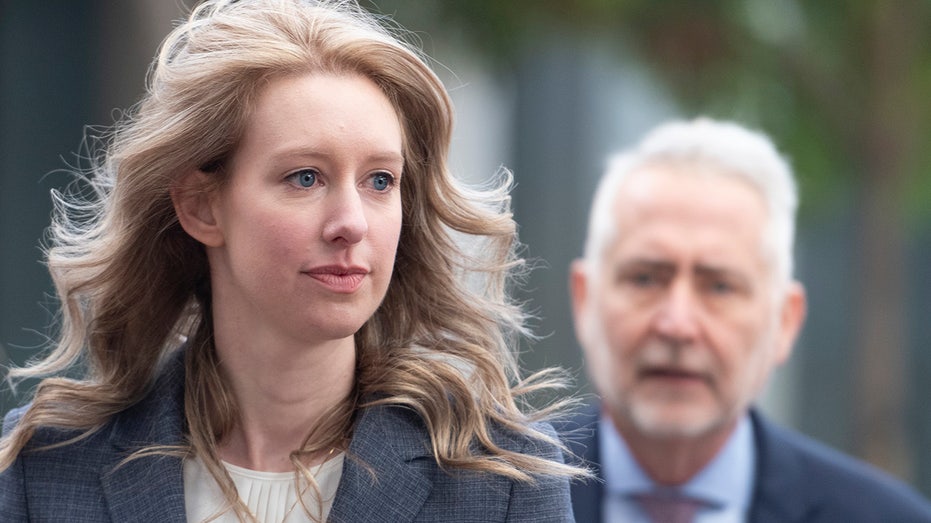Theranos founder Elizabeth Holmes renews fight to constrain prosecutors
Lawyers for defunct startup’s former CEO say their defense to criminal-fraud charges is hampered because a database with millions of blood-test results was dismantled
Pregnant Elizabeth Holmes arrives at court
Theranos founder Elizabeth Holmes makes her first court appearance in over a year.
Lawyers for Theranos Inc. founder Elizabeth Holmes asked a federal judge to place new restrictions on the scope of evidence that prosecutors can present at her coming criminal-fraud trial, arguing her defense is hampered by the loss of a database with millions of blood-test results.
During a virtual hearing, Ms. Holmes’s lawyers and the U.S. attorney’s office in Northern California continued months of finger-pointing over who is to blame for the inability to access the blood-test database. Called the Laboratory Information System, it recorded data points on millions of Theranos blood tests but became inaccessible in 2018 under circumstances the prosecution and defense disagree about.
Ms. Holmes’s lawyers argued that without the database, jurors shouldn’t be allowed to hear anecdotal evidence from patients who received inaccurate blood tests, or see a report from federal regulators finding deficiencies in Theranos’s labs in the years leading up to its 2018 collapse. The database would have given jurors a larger picture of the test results instead of anecdotes, and context around the regulator findings, the lawyers said.
GET FOX BUSINESS ON THE GO BY CLICKING HERE
Ms. Holmes is slated to go to trial Aug. 31 on charges that she defrauded investors and patients about Theranos’s technology and whether it was capable of accurately testing blood using proprietary devices that purported to need just a few drops of blood from a finger prick. As The Wall Street Journal first reported in 2015, many Theranos blood tests were actually run on commercial analyzers, including some that had been altered to work with diluted finger prick blood.
Ms. Holmes, who is due to have a baby this month, has pleaded not guilty.
Ms. Holmes’s motion to suppress evidence, the subject of the Wednesday hearing, is the latest in a string of attempts to block jurors from seeing federal regulators’ reports and from hearing anecdotes from patients who used Theranos’s tests.
U.S. District Judge Edward Davila ruled in May that jurors could hear the patient stories, though he restricted the testimony to facts about the inaccurate tests and the money they lost by paying for them, rather than discussion of any emotion or physical harm that may have befallen them if they relied on the tests. The judge ruled at the same time that prosecutors could present the regulator reports.
On Wednesday, Ms. Holmes’s lawyers made another attempt to exclude the patient stories and regulator findings, this time focused on the importance of the lost database.
Both sides agree that prosecutors were given a copy of the database in late August 2018. The government initially didn’t have the correct software to access the large files, according to court filings, and once they did, they realized they weren’t given a necessary second password.

Elizabeth Holmes, founder and former CEO of Theranos, arrives for motion hearing on Monday, November 4, 2019, at the U.S. District Court House inside Robert F. Peckham Federal Building in San Jose, California. (Photo by Yichuan Cao/NurPhoto via Getty (Getty Images)
TRUMP ADVISER JASON MILLER'S APP GETTR SEES THOUSANDS OF DOWNLOADS AFTER LAUNCH
Ms. Holmes’s lawyers and prosecutors also agree that four days after the government received its copy of the database, Theranos employees and contractors dismantled the servers containing the original version.
Amy Saharia, a Williams & Connolly LLP partner representing Ms. Holmes, said there was no indication Ms. Holmes played a role in the database being taken apart and objected to any notion that it was "destroyed."
"It’s not like someone took a hammer to the server" in the company parking lot, she said.
Ms. Saharia said Wednesday that the government should have tried within a day or two of receiving the database to view it, and that if they had, they might have been able to get the password before it was too late. She also suggested that they could have tried to re-create the system with Theranos’s physical servers.
Ms. Saharia said the situation called for a longer hearing so the judge could draw definitive conclusions about what happened.
Assistant U.S. Attorney John Bostic pushed back on whether the government should have tried harder to view the files, but also said the database isn’t the crucial piece of evidence Ms. Holmes’s side makes it out to be. "The idea the LIS would have enabled the parties to determine an overall failure rate is simply false," Mr. Bostic said, adding that there was no data field showing if a test was accurate or inaccurate. "This case was charged based on other evidence."
CLICK HERE TO READ MORE ON FOX BUSINESS
Ms. Saharia said that even without that, the results could have been analyzed in an aggregate way that shed light on overall accuracy, and that the database would have made clear how many tests were run on Theranos’s proprietary devices versus commercial analyzers.
"Data is a powerful thing because it speaks for itself," she said, quoting a statement Ms. Holmes made at a conference in 2015 that was included in a filing from prosecutors.
Judge Davila, in San Jose, Calif., said he would consider the request to suppress the evidence and whether a longer hearing was needed to determine what happened to the database. In a nod to Ms. Holmes’s coming due date, Judge Davila ended the hearing by saying, "Let me just extend our best wishes to everyone in future endeavors. We hope the best."
Click here to read more on the Wall Street Journal.




















